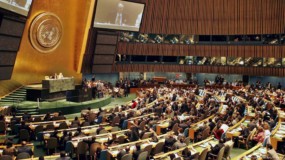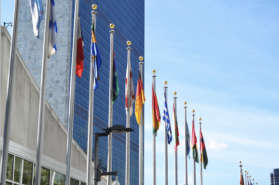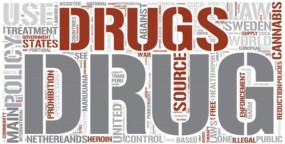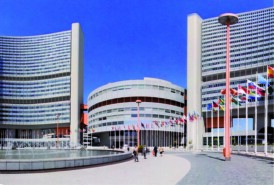Posted on 16 Jun 2021
Illicit environmental economies are increasingly intertwined with, and facilitated by, corruption. The United Nations General Assembly Special Session (UNGASS) against Corruption took place at the UN in New York from 2 to 4 June 2021. As part of the official side event programme, the Global Initiative Against Transnational Organized Crime joined Transparency International and the Wildlife Justice Commission in co-sponsoring a session hosted by France – Leveraging the Best Tools to Address Environmental Crimes Enabled by Corruption.
During the UNGASS plenary debate, several speakers reinforced the growing urgency of adopting an effective approach to combating and preventing corruption. Has the international community, however, met the challenges of tackling the broad range of manifestations of corruption, and its links with organized crime?
Environmental crime is a particularly stark example of how corruption weakens institutions and the rule of law, threatens the functioning of the formal economies, and degrades our natural ecosystems. In particular, the illicit conduct of corrupt politicians and officials undermines the implementation of effective responses to environmental crimes and facilitates the control of legal markets by criminal groups. This side event offered a unique opportunity to gather valuable insights from the experts on the impact of corruption on three main forms of environmental crime: wildlife trafficking, illegal logging and illegal mining. It explored how the nexus between crime and corruption enables the illicit trafficking of natural resources and species across borders, and impedes the investigation, prosecution and punishment of these crimes. Below is a brief summary and a recording of the event.
The event was opened by France, which has prioritized the need to combat crimes related to the environment – including its commitment around adopting the UN resolution on Preventing and combating corruption as it relates to crimes that have an impact on the environment at the Eight Session of the UNCAC Conference of Parties. This is the first ever UN-issued resolution designed to address as a whole the fight against environmental crimes as they relate to corruption. The French Ambassador-at-Large on Transnational Criminal Threats, Jean-Claude Brunet, reminded the international community that it has at its disposal two very important tools providing the legal framework for the prosecution of serious crimes, including environmental crimes: UNTOC (United Nations Convention against Transnational Organized Crime), and UNCAC (United National Convention against Corruption). Ambassador Brunet encouraged states to utilize these treaties, as criminal groups have increasingly diversified their activities and continue to illegally exploit natural resources – driven by the opportunity to maximize their profits while minimizing the risk of punishment.
Speakers addressed both the wider context within which these markets operate and the critical role played by corruption, and the ways in which the international response to these threats should be strengthened.
Panelists Vusi Pikoli, GI-TOC board member, and José Ugaz, member of Transparency International’s International Council, shared their experiences stemming from their distinguished careers in the justice sectors. They highlighted very similar dynamics in discussing illegal mining and logging, while emphasizing the greater detrimental impact that environmental crime has in more vulnerable societies. In particular, they drew parallels in these two illicit economies between grand corruption, impunity and extreme harms caused to people and the environment as a consequence. Ugaz highlighted the tremendous difficulties faced by civil society organizations in bringing justice to indigenous people living in the Amazonian, where illegal logging occurs on a grand scale. As impunity is commonplace in this industry, Ugaz called for more urgent steps to improve law enforcement measures, and more public participation and transparency in judicial processes. In the case of illegal mining, Pikoli emphasized the need for an effective and coordinated response that should directly address corrupt politicians and government officials, and one that must seek to balance the tension between combating criminality on the one hand while maximizing developmental goals on the other.
It is evident that there is a need for more tailored responses and more effective action when it comes to tackling organized environmental crime. Panelist Sarah Stoner, director of intelligence at the Wildlife Justice Commission, urged states to implement law enforcement measures in regard to wildlife crimes – such as Articles 49 and 50 of the UNCAC on strengthening international cooperation. She outlined how joint investigations into money laundering/corruption and wildlife trafficking, which are currently lacking, can be key in addressing the transnational nature of these crimes. From a multilateral perspective, Maria Adomeit, crime prevention and criminal justice officer at the UN Office on Drugs and Crime (UNODC), outlined a risk-management programme implemented by the UNODC with member states that evaluates which risks should be prioritized and how the international community should mitigate them. For example, financial investigation techniques are being increasingly used to uncover the financial flows that may derive from corruption and have an impact on environmental crimes.
This event is part of a growing recognition that environmental crimes are a collective obstacle to efforts to mitigate climate change and promote sustainable development. For instance, this month, the G7 ministers for Climate and Environment recognized illicit threats to nature as a critical area to address as part of these efforts. The link between corruption and environmental crimes presents particularly challenging impediments to implementing existing responses, as was heard during this event. This event highlighted how the widespread impunity, often fuelled by weak and corrupt institutions, has enabled actors to engage in environmental crimes, motivated by the lucrative proceeds. Moreover, the event highlighted the need to develop and implement strategies that reflect the necessities of the local population. In so doing, civil society organizations play a critical role in promoting the interests of the communities while preventing civilians from being involved in criminal activities. This needs to include further addressing how civil society organizations could turn criminals into active agents of change in the drive to combat environmental crimes.



